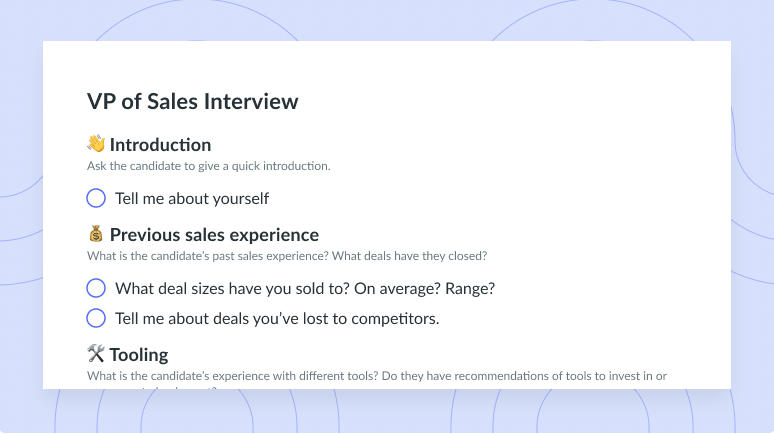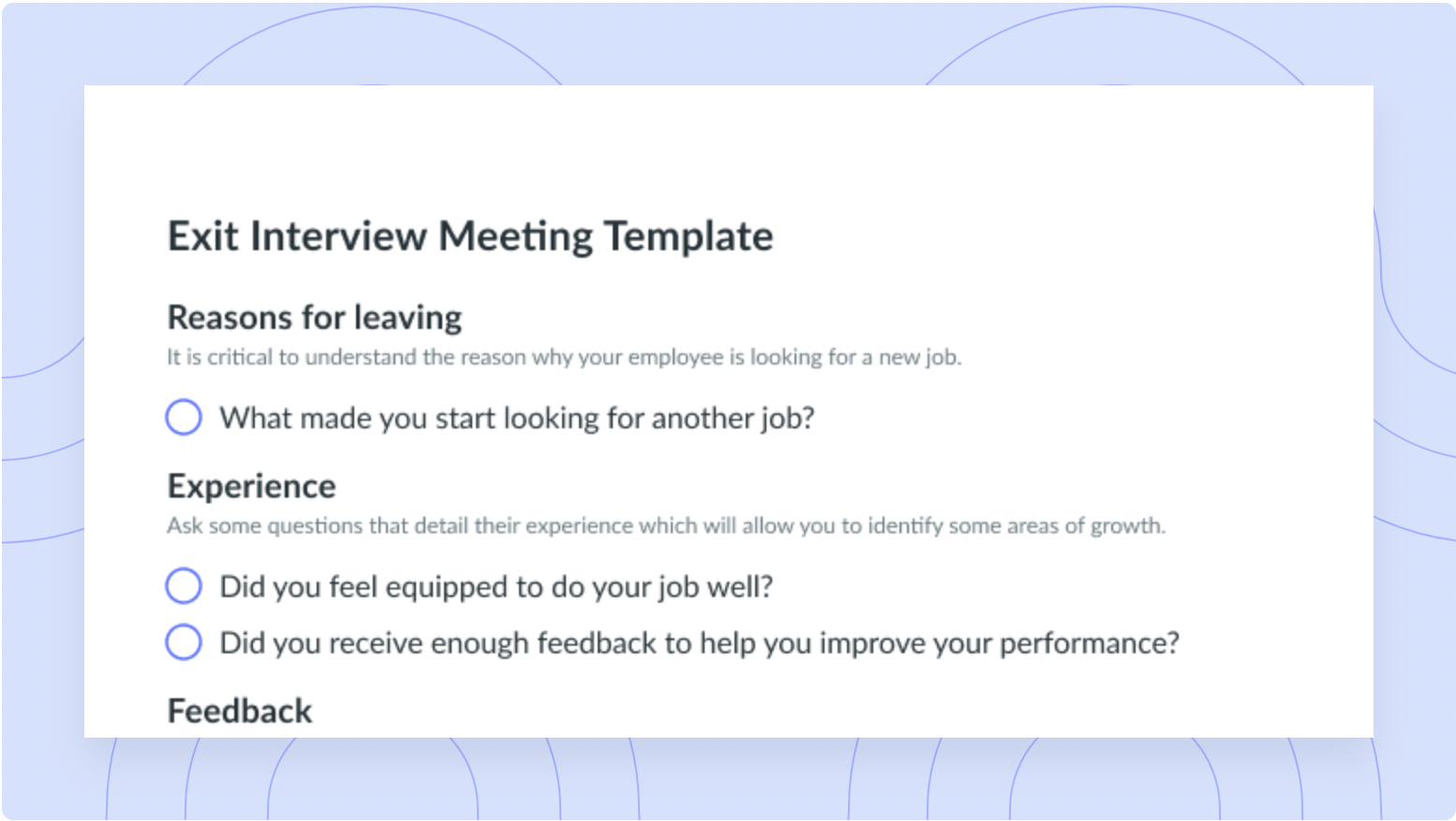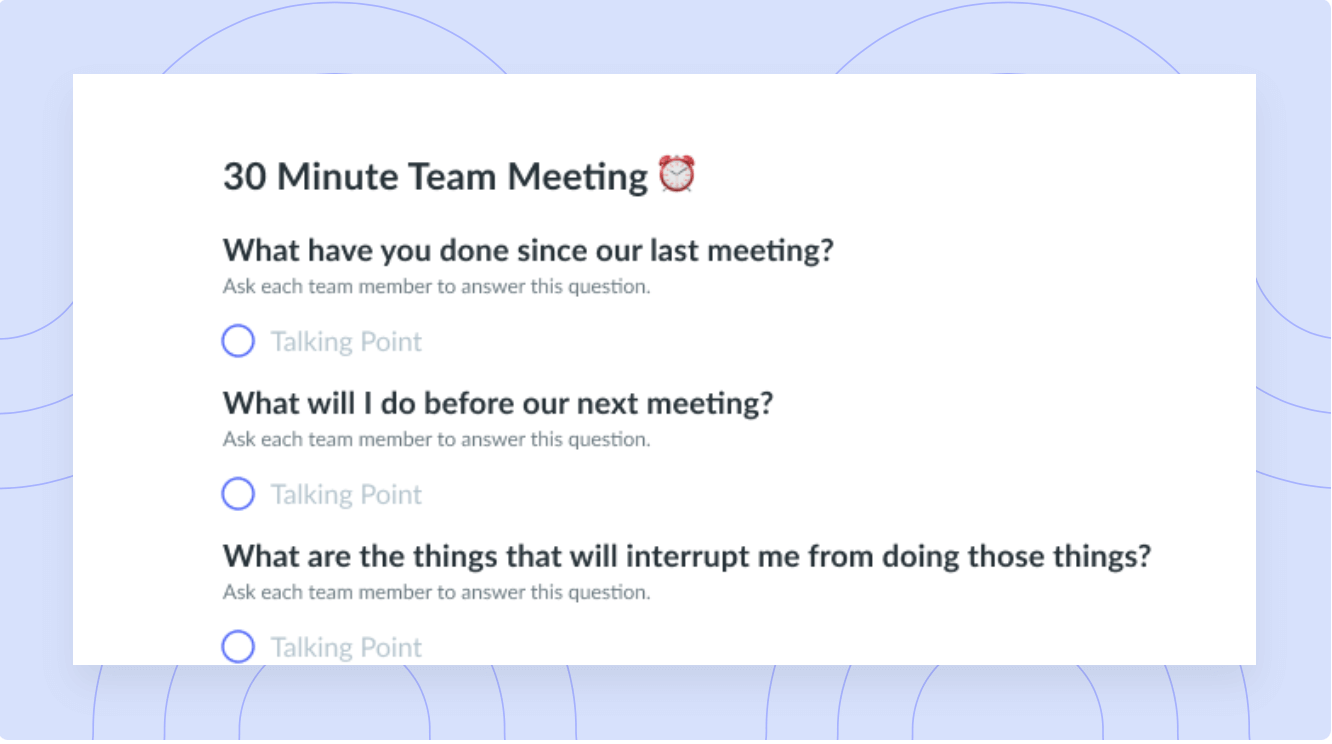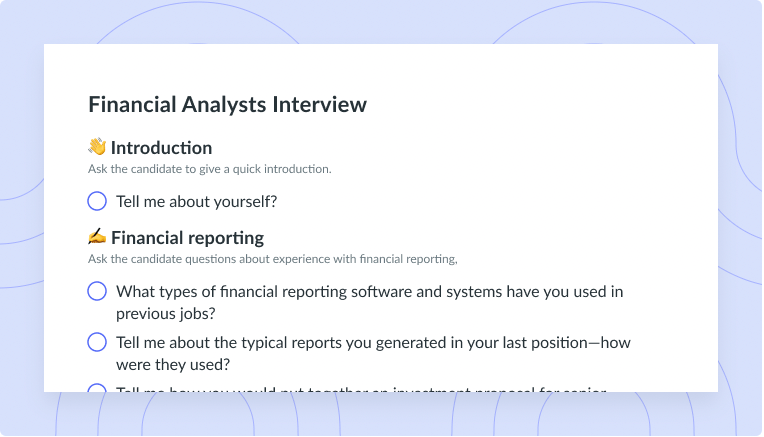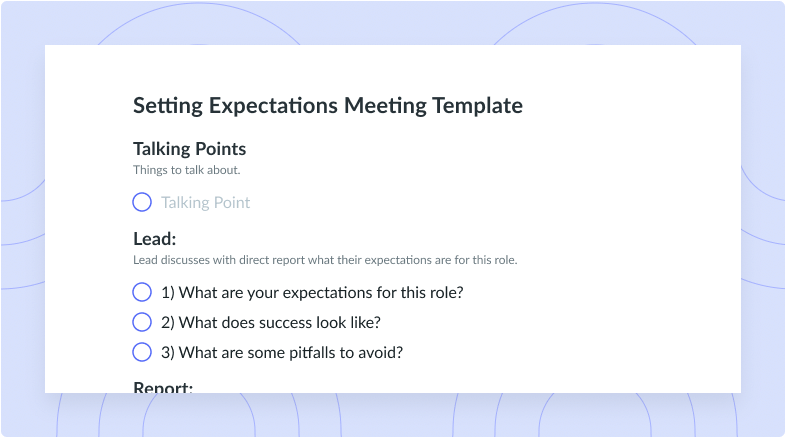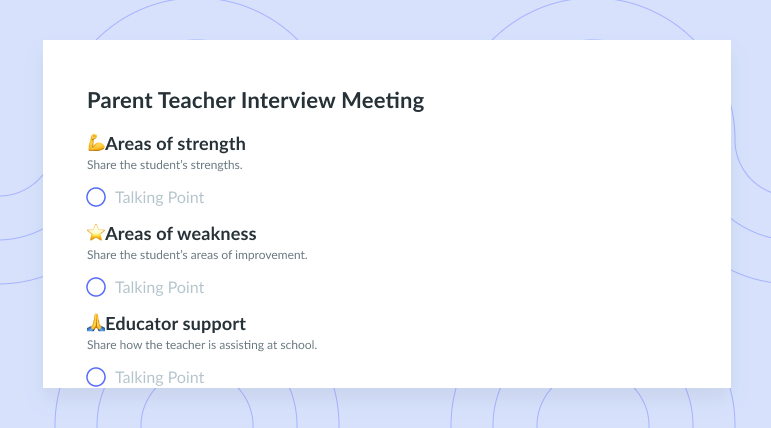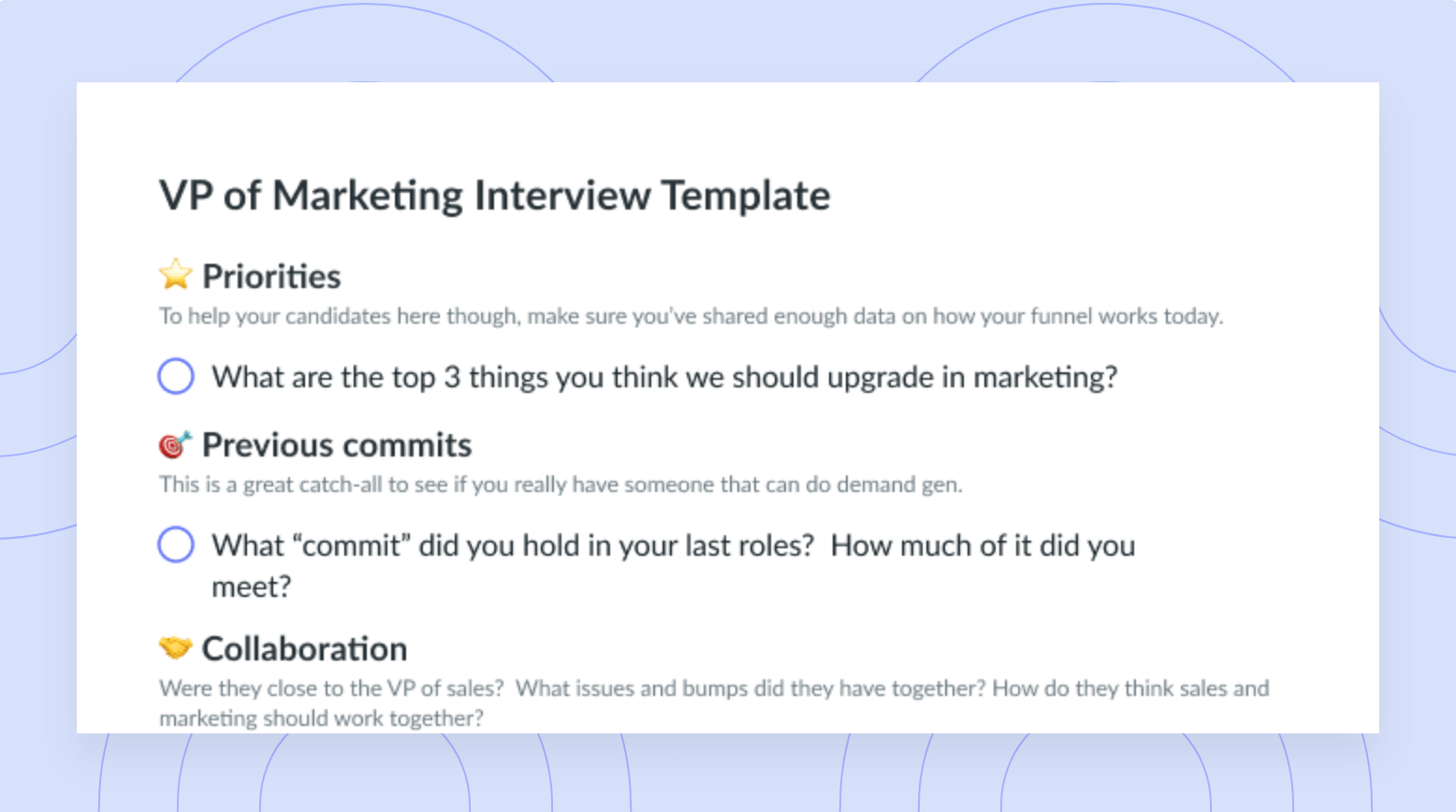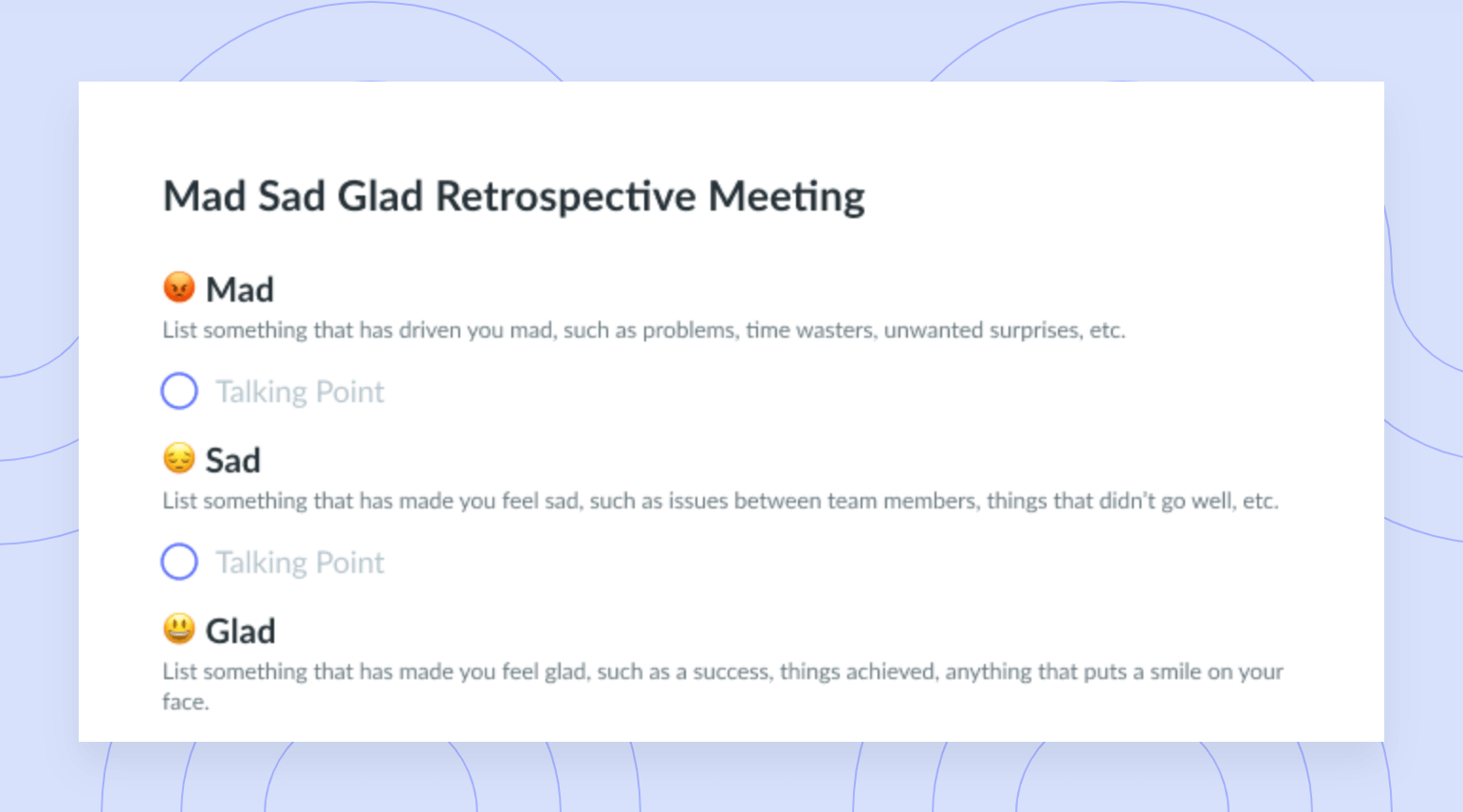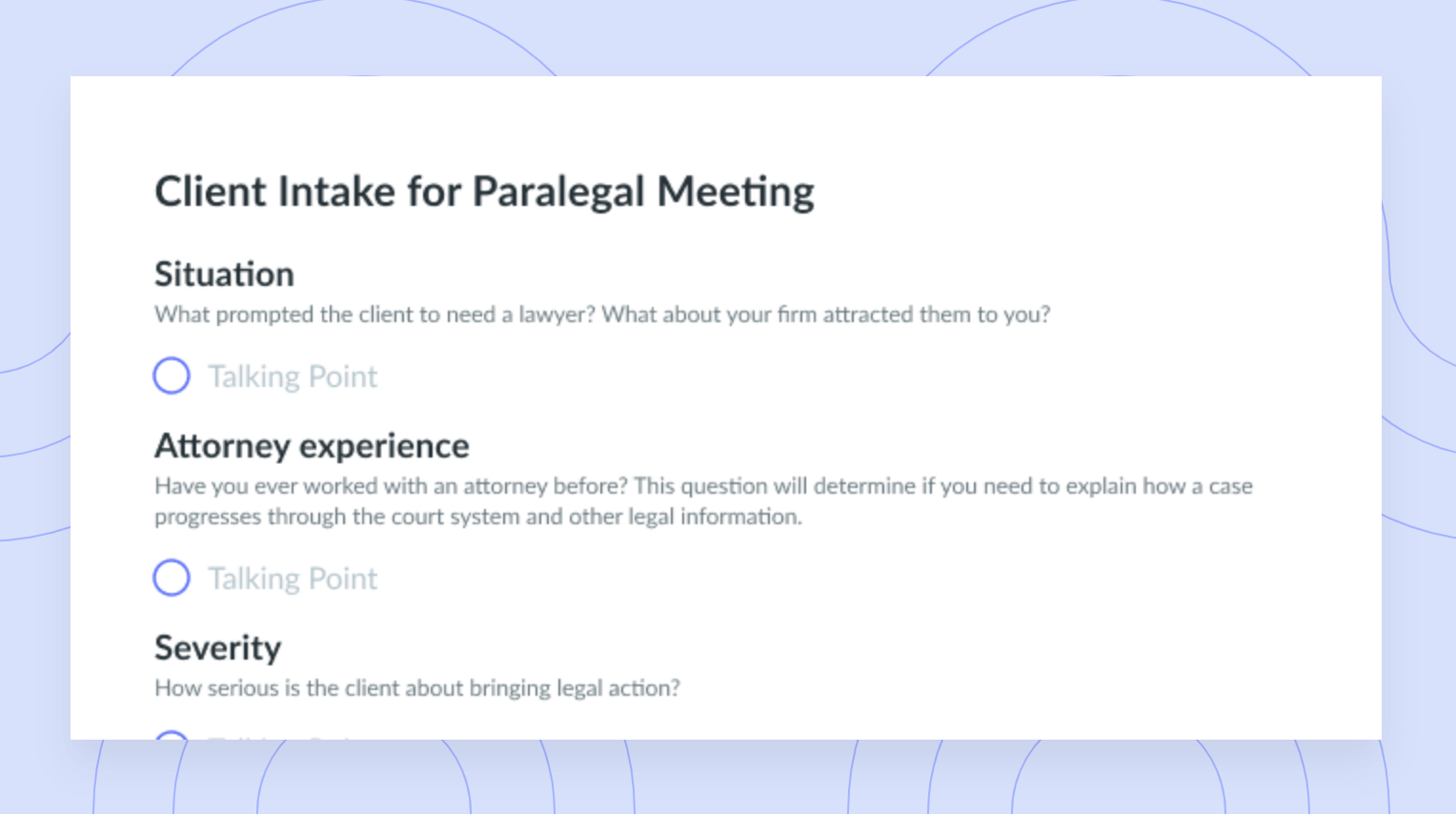Stay Interview: What They Are + Example Questions to Ask
Stay interviews help your team feel engaged and satisfied with their work. Learn 10 tips to help you conduct a productive stay interview.
Whether your team is mainly newcomers or trusted long-timers, it’s in your best interest to keep the team together. Everyone’s accustomed to your style of working, team dynamics, and your organization’s culture. They’re a group of folks who you want to stay excited and motivated when it comes to their work. You can help make that happen with stay interviews. Read on to discover what a stay interview is and learn which questions you should ask your team members.
- What is a stay interview?
- Benefits of conducting stay interviews
- How to conduct a stay interview
- Examples of stay interview questions to ask
What is a stay interview?
A stay interview is essentially the opposite of an exit interview. Instead, it’s an informal conversation between you (or another manager) and a team member about why they like your organization and what motivates them to stay.
Any questions you ask should help you gain better insight into how your organization can make life better for this team member – and everyone else. You can also use a stay interview to discuss a team member’s future with your organization.

Run productive stay interviews
Run productive stay interviews with a collaborative agenda that everyone can contribute to. Try using a tool like Fellow!
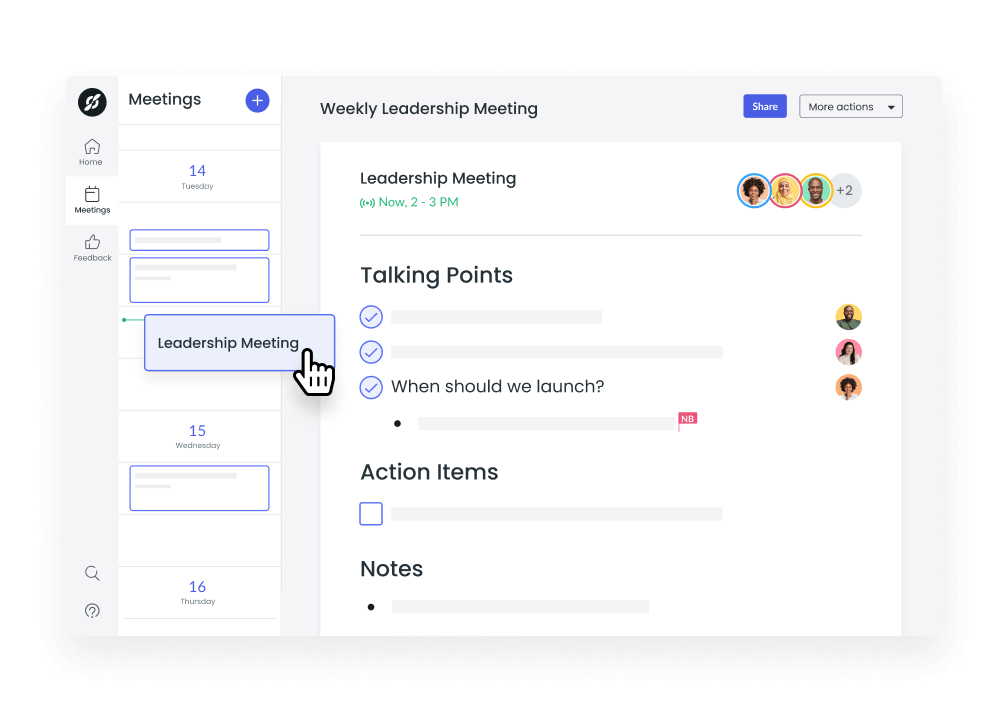
Benefits of conducting stay interviews
There are three main benefits to conducting stay interviews, especially with your most valued team members. Learn more about these benefits below.
- You’ll receive honest feedback
- You’ll increase employee satisfaction rates
- You’ll boost employee retention
You’ll receive honest feedback
Maybe you think your team members love working for you due to your flexible hours and challenging projects. But what if there’s another reason you don’t know about? Conducting stay interviews is a great way to get this feedback directly from team members. Maybe you’ll hear that your paid time off policy for long-term team members is super generous. You can act on that feedback – maybe it’s time to extend that policy to all team members.
Pro tip: Fellow enables your team to share real-time feedback on meetings, projects, and performance.
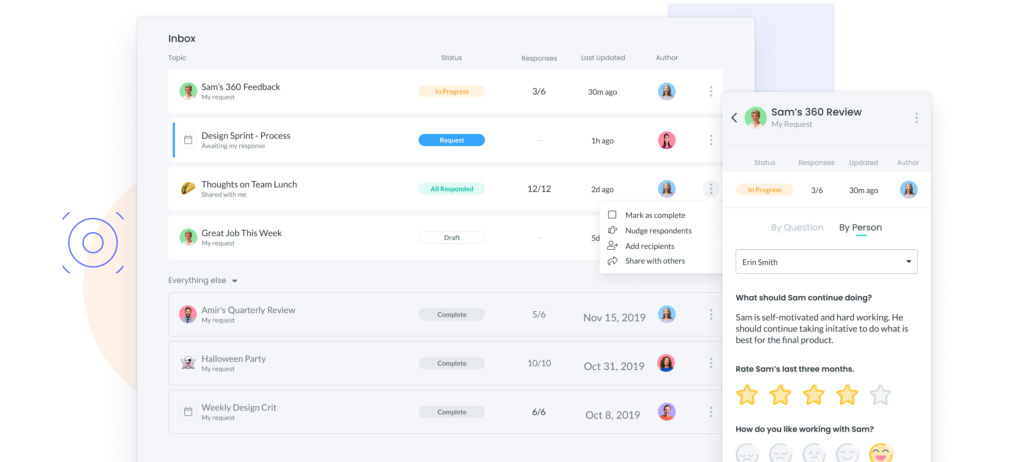
You’ll increase employee satisfaction rates
Stay interviews can help you see exactly where you need to make changes to keep your team members around. This sort of open communication between you and your team can increase their satisfaction with their role in your organization – but only if you act on what people say. After a team member tells you what could go better, you should act on this feedback rather than putting it on the back burner. Your quick, meaningful efforts signal that you care, which can make your team happier.
You’ll boost employee retention
A great stay interview shows you why team members love working for your organization and what you need to improve. Make these changes, and you’ll probably find that your team members will keep sticking around. That’s a fast way to increase your employee retention rates – and higher rates are great to bring to your next operations meeting.
How to conduct a stay interview
Below are a few tips on how to conduct a stay interview that’s positive and productive for both you and your team.
- Don’t go overboard
- Set a schedule for your stay interviews
- Determine who will conduct the interview
- Decide when to hold stay interviews
- Schedule the right amount of time
- Create an interview template
- Ask relevant questions
- Summarize the interview
- Identify any patterns
- Take reasonable action
1Don’t go overboard
You don’t need to conduct stay interviews with each and every team member. Instead, you should focus on the people who have been with the organization long-term, who always do great work, or who take initiative – all people who you want to stick around.
Your most valuable team members can probably give you better insights into your organization than newer or less engaged colleagues as well, so keep that in mind when scheduling stay interviews.
2Set a schedule for your stay interviews
You should schedule stay interviews regularly. That doesn’t mean nearly as often as daily stand-up meetings – think quarterly or every six months. Ideally, you should hold stay interviews at least once per year, independent of performance reviews.
3Determine who will conduct the interview
Maybe you’ll decide that HR should conduct stay interviews. Maybe you’ll take the task on yourself. It’s up to you! However, keep in mind that managers usually have stronger relationships with their team members, so it may be best for you to run the show. If that makes you nervous, you can always ask other managers for advice, or reach out to your LinkedIn network for some more helpful pointers.
4Decide when to hold stay interviews
The timing of your stay interviews depends on two factors. For starters, there’s the schedule you set in one of the above steps. But there’s also the timing of where your interview lands in your team member’s trajectory. Namely, you don’t want to conduct a stay interview with a brand new team member. These team members are just starting to learn their roles and haven’t settled in yet. But they could be great stay interview candidates down the line.
Another important factor: You should separate a stay interview from a performance review. Lining them up too close to each other can blur them, and that’s not good – one is about performance, the other is about satisfaction. You can schedule all your stay interviews within a short time frame to avoid this trap. This way, you can get all the feedback you need in one fell swoop and act on it all at once.
5Schedule the right amount of time
When you’re first starting your stay interviews, you should set aside an hour for each interview. Once you’ve conducted a few interviews, you’ll have a better idea of how long each interview actually takes. Maybe you’re getting them done effectively and meaningfully in half an hour – great! You can put that in the calendar next time.
6Create an interview template
Each stay interview should be roughly the same – as in, you should ask nearly the same questions each time. An interview template can help you keep following the same pattern. It’s also a great way to quickly bring other interviewers in on the process if you decide that’s the right call.
7Ask relevant questions
Certain questions will get you better feedback and prevent you from wasting anyone’s time – you don’t want to spread meeting recovery syndrome around the office. Ask these questions and only these questions (which you’ll see soon enough if you keep on reading).
8Summarize the interview
At the end of each interview, you should summarize what the team member said and what you’ve agreed to do afterward. This way, you’ve both heard each other correctly – and great communication is another way to keep team members around.
9Identify any patterns
Once you’ve conducted a few interviews, ask yourself: Do you notice any patterns about why these team members are staying with your organization? These trends can help you figure out what you’re doing well. And any trends you don’t see can point to areas where you might need to change things for the better.
10Take reasonable action
The main reason you conduct stay interviews is to figure out how to keep your team members happy and thriving. That’s why you should take notes during each interview and act on them not long afterward. Realizing everyone loves work-from-home Fridays means nothing if you don’t consider a plan to go remote on Thursdays too.
Examples of stay interview questions to ask
The below stay interview questions can be great starting points for what you should ask your team members. That said, keep in mind that these questions may need proper follow-up to get you the most actionable feedback possible.
What motivates you to show up for work every day?
Start your interview on a light note and ask each team member what excites them about showing up every day. For some, it may be that they work with some of their best friends, while for others, it could be the company culture. You could use some of their answers in your job listings to appeal to potential new hires.
Is there anything you dread about coming to work?
It only makes sense to follow up the first question by asking the opposite. This way, you can get right to the point if there’s something your team members don’t like. And then, you can immediately work on fixing it.
What specific situation would make you want to leave?
When you word the question this way, you’re asking your team members to describe why they would leave based on something within the organization. Put another way, you’re asking what would make them leave without a higher salary or a better location on the table with another organization. Instead, you’ll learn what to watch out for at your organization moving forward.
Do you feel valued here?
This question could go one of two ways. If you hear “yes,” that might explain your great employee productivity, engagement, and retention rates. On the contrary, if your team members don’t feel valued, that might be why so many others have left your organization. It’s a sign that you need to take immediate action.
How would you like to be recognized?
Every team member has a different personality, so naturally, they’ll all have their own preferences. Maybe one person works better when they get daily positive feedback. Maybe someone else might want a way for you to highlight everyone’s wins and get everyone celebrating. Knowing how each member truly feels recognized can help you keep team members around and quickly get new hires feeling great.
Do you think we have a good work-life balance? How can we improve?
Work-life balance is a huge employee retention factor. Jobs without one often leave team members feeling overly stressed and burned out. If you notice that more team members are coming in early or are staying late into the night, you may find that their lack of work-life balance impacts their quality of work.
Maybe work-from-home options can help with flexible work schedules that lower everyone’s stress. Or maybe it’s time to hire someone new to help share your team’s responsibilities.
Would you recommend working here to your friends?
Your team members know better than anyone what it’s like to work for your organization. If they’d recommend your organization to their friends as a workplace, that’s a pretty good indicator you’re doing things right.
If team members often say “yes” to this question, ask why, then use what they say in future job listings. If your team members wouldn’t recommend working here, figure out why, and act fast to change things.
Can you recall a day when you felt extra stressed this past year?
This question can help you identify whether there are any serious problems in the workplace. After you ask this question, follow up by asking about the source of their stress and how the issue was resolved. This can help you figure out what isn’t working for your team – and how you can help them in the future.
Can you tell me about a recent good day at work?
When a team member tells you about their best workdays, you can learn a lot about how they work. For example, let’s say a team member says they loved it when you highlighted their wins in last week’s meeting. You can quickly figure out that employee recognition works wonders for this team member and make a point to recognize them more often.
What software program or tool do you not like using here?
If there’s a tool that you find many team members simply don’t like, you should look for alternatives. A frustrating software program or tool that a team member has to use often can be enough to get them thinking about leaving.
Do you have enough resources to complete your work efficiently?
If certain team members don’t feel they have enough resources to do their work well, they might struggle to enjoy their work. If you hear a bunch of team members saying the same thing, you should quickly course-correct. Ask them what they’d need to do better work, then get it to them sooner than later.
What did you love about your last job?
When you ask this question, you might hear answers about the team member’s former work, company culture, or their relationships with other team members. Their answers can give you some ideas as to how you can improve your own work environment. If many team members value the same thing about their last job and you don’t have that thing, it’s time to get it in place.
What can I do to improve your experience here?
This question is a great way to end your interview – it might be the most important thing you ask. After all, you have the power to make many of the changes your team members might mention. And surely, you want your team members to stick around and tell other people about your great work environment. When you listen to and act on what team members say, you’ll build trust and create a better organization for everyone.
Prepare for your stay interview with Fellow
Figuring out how your organization can improve your team members’ satisfaction and engagement can keep everyone around for longer. You can get even more out of your stay interviews with a meeting tool for taking notes and giving yourself meeting action items. With Fellow, you can do both while scheduling meetings and exchanging feedback – all under the same roof.








![How to Conduct a Successful Listening Tour [+ Example Questions]](https://fellow.app/wp-content/uploads/2022/03/listening-tour.jpg)
